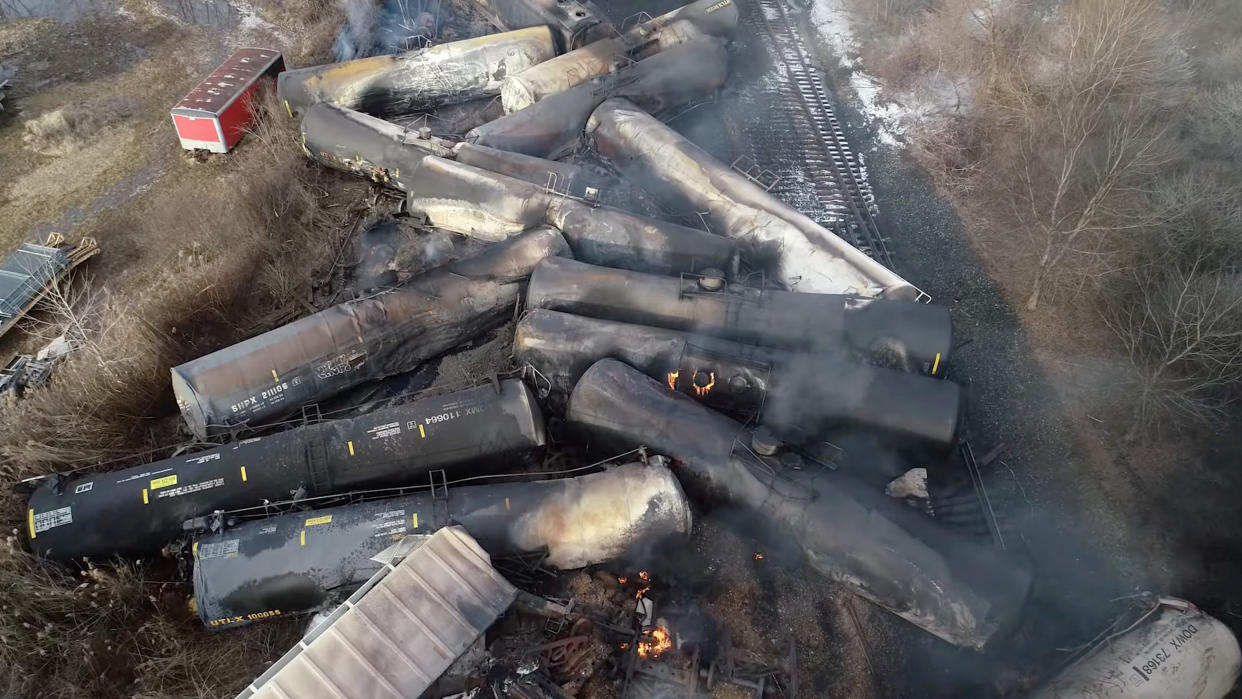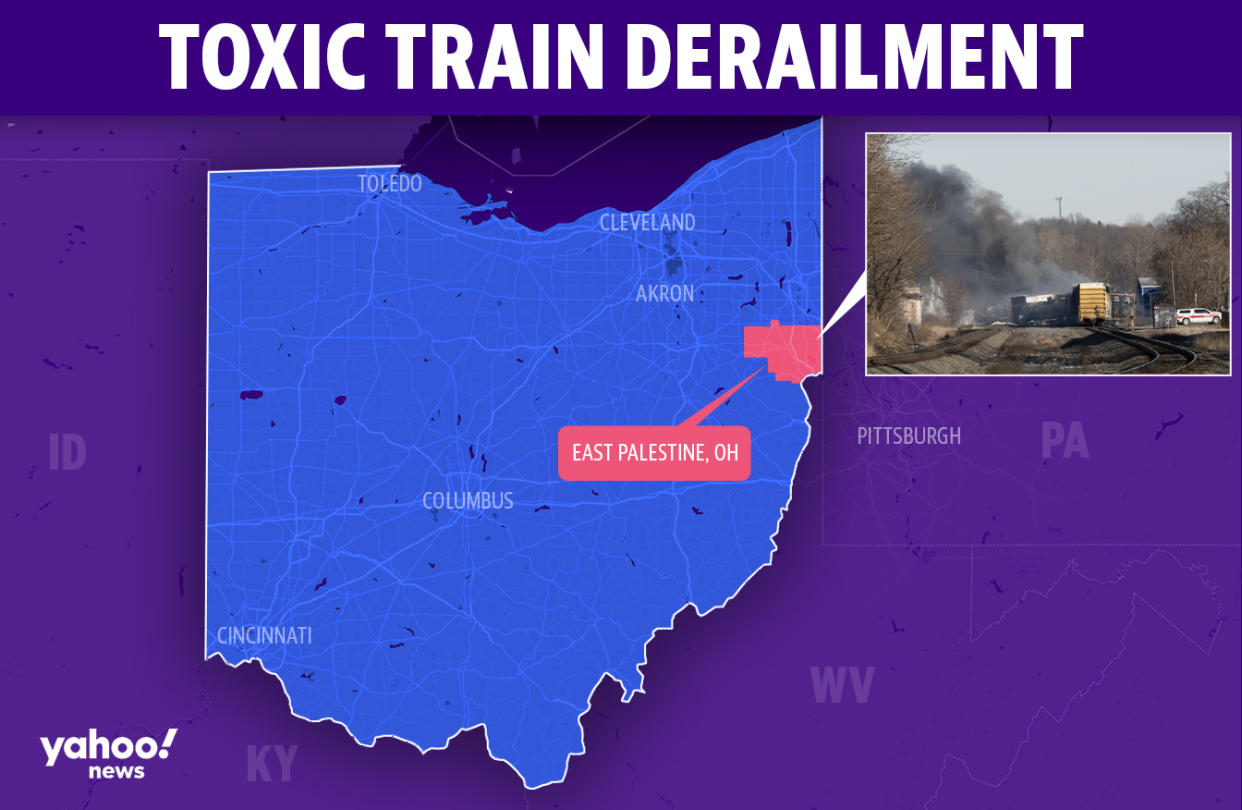Ohio governor calls on D.C. to address 'absurd' train regulations after toxic derailment
Ohio Gov. Mike DeWine is calling on Congress to re-examine some federal railroad regulations, after the derailment of a train carrying hazardous materials in his state triggered an explosion that sent toxic chemicals into the air and nearby waterways.
At a press conference Tuesday afternoon, DeWine, a Republican, said he was informed that the railroad company was not legally required to alert anyone in Ohio about the toxic cargo because only some of the cars on the Norfolk Southern train that derailed earlier this month were carrying hazardous materials.
“Frankly, if this is true, and I'm told it’s true, this is absurd,” DeWine said. “Congress needs to take a look at how these things are handled.”
DeWine did not elaborate on the specific regulation he was referring to, but his comments come amid mounting questions about whether rollbacks to federal railroad safety regulations were to blame for the Feb. 3 derailment near the Ohio-Pennsylvania border of roughly 50 freight train cars, 10 of which were carrying hazardous chemicals.
Days after the initial crash, which caused a massive fire near the town of East Palestine, railroad crews conducted a “controlled release” of toxic chemicals from some of the derailed cars that were at risk of exploding, sending an ominous plume of black smoke into the sky.

Speaking alongside several state health and safety officials in Columbus, DeWine also sought to address growing health and safety concerns expressed by some local residents, who have reported strange odors, burning eyes and sick animals, even though they had been assured it was safe to return to their homes. DeWine called for a full evacuation of the area last Monday, before the state said it was safe for everyone to return two days later.
Asked whether he would return to his house if he lived in East Palestine, DeWine said, “Look, I think that I would be drinking the bottle of water, and I would be continuing to find out what the tests were showing as far as the air. I would be alert and concerned, but I think I would probably be back in my house.
“I understand their skepticism, and I understand their anger,” the governor said of residents who were affected. “And, you know, if I lived in the community, I would be angry, too. [Norfolk Southern] caused this problem, they’re going to be held accountable.”
DeWine said he spoke to the CEO of Norfolk Southern, who “gave me his word and his commitment” that the railroad company would stay in East Palestine until the damage from the derailment was completely cleaned up. On Monday, the Environmental Protection Agency sent a letter to Norfolk Southern saying that it had failed to properly dispose of contaminated soil at the crash site in its effort to get the railway reopened.
Shortly after DeWine’s press conference, Pennsylvania Gov. Josh Shapiro, a Democrat, sent a letter to Norfolk Southern expressing "serious concerns" about its handling of the accident. Shapiro’s accusations included claiming that the company caused confusion with its response, gave inaccurate information about the impact of the chemical release, and didn't explore alternative courses of action.

Ohio state officials at the Tuesday afternoon press conference said they were not concerned about anecdotal reports of residents developing symptoms like headaches, sore throats and rashes, while discounting reports of dead livestock.
Dr. Bruce T. Vanderhoff, director of the Ohio Department of Health, said that while it was possible that residents were smelling some of the chemicals at low levels and experiencing common symptoms, “air sampling in that area really is not pointing toward an air source for this.”
“Everything that we've gathered thus far is really pointing toward very low measurements, if at all,” Vanderhoff said. “And what I would encourage people who are having those symptoms to do is No. 1: Contact your medical provider. And No. 2: Call the local hotline to let them know that you're experiencing this. So a team can get out and check their environment.”
Brian Baldridge, who leads the state’s Department of Agriculture, said: “There's nothing that we've seen in the livestock community that causes any concerns to the state.” Nevertheless, he encouraged residents to reach out to their local veterinarians if their animals developed symptoms.
The Ohio Department of Natural Resources said that while 3,500 fish were killed in the immediate aftermath of the derailment, “There doesn't appear to be any increase in the fish or aquatic creatures killed since the first couple days of the derailment. So wildlife officers have been there every day on the scene, working with contractors who are in the water, doing the net sampling, making the estimates. And we will continue to monitor and watch what's going on and eventually hold those responsible accountable for the loss of wildlife in the area.”
Railroad employees are hopeful that the focus on the latest derailment helps gain public support for a change in the way business is done. Matt Weaver, the Ohio Legislative Director for the Brotherhood of Maintenance of Way Employes Division of the International Brotherhood of Teamsters (BMWED-IBT), told Yahoo News that he thought “derailments are far more common than the public know,” adding “the only ones that are spoken about are the ones that are Federal Railroad Administration reportable.”
Asked about the response from Biden and the U.S. Department of Transportation, Weaver said he felt that it was insufficient, adding, “They should strike while the iron is hot and enforce these regulations and make things safer."
He added: “I think perhaps [Transportation Secretary Pete Buttigieg] has dropped the ball here. Let's do an investigation, let's have the NTSB get a report out and find out how we can make things better. And I feel that not getting feedback from the Department of Transportation and even the administration is a bit frustrating.”

Railway unions have been particularly critical of Buttigieg, who did not issue a statement on the Feb. 3 crash until the evening of Feb. 13. He then began a series of tweets by writing, “I continue to be concerned about the impacts of the Feb 3 train derailment near East Palestine, OH, and the effects on families in the ten days since their lives were upended through no fault of their own.”
The noted environmental activist Erin Brockovich was also critical of the Biden White House, writing Monday night, “Doing better than your predecessor, is not doing enough. The Biden administration needs to get more involved in this [Ohio] train derailment now. We are counting on you to break the chain of administration after administration to turn a blind eye. STEP UP NOW.”
DeWine was more positive on the federal response, saying that Biden had called him last week. “He told me that he wanted to just assure me that anything I needed from the federal government they would supply," he said, "and told me to call him personally if there was anything we needed at that point.”
Weaver said one change that would help is a mandated improvement to electronic braking systems versus the current mechanical air brakes, which date back to the 19th century. He added, “The government should require them to do better. Let's make things safe for the public and the workers.”
Another issue pointed to in recent years by railroad workers is the use of Precision Scheduled Railroading, which results in longer trains with more cars, and less time for inspections.
It also resulted in major cuts to the number of railroad workers, complicating train scheduling. Railway unions nearly went on strike over these issues last year, but were forced back to work by Congress and the Biden administration, disappointing many labor leaders.
“With the man-count being decimated by this Precision Scheduled Railroading, PSR, we're suffering on deferred maintenance, we're not doing preventative maintenance on track bridges and buildings, and we don't have enough manpower to get the work done. I think that they've cut extra boards,” Weaver said, referring to the pool of workers used to back up regular employees.
“So transportation is really suffering on being on call all the time. Lack of good rest and good, defined, work times are a big issue with train crews.”
